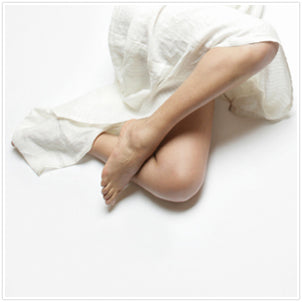- HOME
- LATEX MATTRESS REVIEWS
- TYPES OF LATEX
- LATEX FAQ
- LATEX TOPPERS
- LATEX & MEDICAL CONDITIONS
- LATEX & SLEEP DISORDERS
LatexMattress.org
Rated by Viewers
What is Restless Leg Syndrome?
Restless Leg Syndrome, or Restless Legs Syndrome (RLS), is a little-known disorder affecting the extremities usually the legs, but occasionally the arms as well. When patients with RLS lie down to relax or sleep, they are faced with a difficult-to-describe compulsion to move their legs, or "leg paresthesia", according to a 1999 article in the peer-reviewed journal Neurology.
According to the ADAM Medical Encyclopedia, RLS can manifest as a crawling or tingling sensation on the lower legs, as muscle aches, cramps, or even partial numbness that goes away when the legs are moved. The compulsion to move the legs can make it difficult or impossible for patients with RLS to sleep well.
Can a Latex Mattress Help You Live with Restless Leg Syndrome?
 The soft, yet body contouring support of a latex foam mattress can help your muscles relax, improving your RLS symptoms and your sleep. A latex mattress isn't a cure-all. But in people with mild RLS (i.e., the majority of RLS sufferers) it may make a very real difference. And for the few people with moderate or severe RLS, it can still make a difference when combined with medication and proper therapy.
The soft, yet body contouring support of a latex foam mattress can help your muscles relax, improving your RLS symptoms and your sleep. A latex mattress isn't a cure-all. But in people with mild RLS (i.e., the majority of RLS sufferers) it may make a very real difference. And for the few people with moderate or severe RLS, it can still make a difference when combined with medication and proper therapy.
According to the ADAM Medical Encyclopedia, RLS tends to be related to stress and anxiety. In these cases, calming and stress-relieving exercises, combined with a comfortable and supportive sleep surface, can help you get the sleep you need. The distinctive pressure-relieving, body-contouring properties of latex can help you find a comfortable sleeping position, but only you can find the restful state of mind you'll need to fall asleep. Even in difficult cases, proper "sleep hygiene" combined with the right mattress will help you relax into your mattress when it's time for bed, falling asleep more quickly and easily, circumventing the trouble of RLS.
In some cases, RLS seems to be related to iron or ferrin deficiencies in the blood. If you suffer from such deficiencies, only your doctor's advice and prescriptions can help you get the relief you need. A natural, resilient latex mattress may help you make the most of your sleep, but only treatment of the underlying problem will truly alleviate your symptoms.
Co-Occurrence of Restless Leg Syndrome with Other Diseases
RLS is often linked to diagnosis with another disorder. These co-existing problems can range from rheumatoid arthritis to diabetes. The British Medical Journal reports a high co-occurrence of RLS with Fibromyalgia. RLS can disrupt sleep over the long term, thus leading to insomniaor chronic sleep deprivation.
In cases where RLS is linked to another disorder, getting your other symptoms under control may help eradicate your RLS without drugs or specialized therapy. A luxe, supportive latex mattress can help you sleep comfortably, even with a range of medical problems.
Drug Therapies for Restless Leg Syndrome
If a comfortable sleep environment and a cushy-yet-supportive, spine-aligning latex mattress aren't enough to eradicate your symptoms, you may have to pursue medical treatment. If your RLS is caused by iron deficiency or complicated by other disorders, good sleep habits and a good mattress may not be enough.
Should you need codeine or another drug that really "knocks you out" in order to sleep soundly, finding a mattress that keeps your spine aligned and your muscles cushioned all night long will minimize the pain of sleeping in uncomfortable positions for long periods. This is where latex really shines as a resilient sleep surface that moves with your body and keeps your body pressure-point free, properly aligned, and pain-free even during long, deep sleep.
Latex Foam Mattresses and Restless Leg Syndrome: The Bottom Line
Natural, botanical latex foam is a one-of-a-kind premium bedding material that combines the best of support, resilience, and pressure-relieving softness. If bodily discomfort or stresses contribute to your RLS, combining the comfort of latex foam with a good bedtime routine and a regular sleep schedule can help you get the sleep that is so elusive to people who suffer with RLS.
If you have underlying medical problems or co-occurring medical conditions, a latex mattress alone may not be sufficient to give you the relief you seek you may find you need a doctor's help. If your doctor prescribes medications that produce side effects or induce deep sleep, the comfort and soft support of a natural latex mattress can keep your body comfortable as you sink into sleep, leaving your troublesome symptoms behind.





